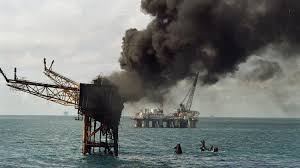Piper Alpha: The Deadliest Offshore Oil Disaster That Changed Safety Forever
“Piper Alpha”
Piper Alpha: The Deadliest Offshore Oil Disaster That Changed Safety Forever
When people talk about the most devastating offshore oil disasters in history, one name stands above all others: Piper Alpha. On July 6, 1988, this North Sea oil platform exploded in a chain of catastrophic events that claimed 167 lives, leaving only 61 survivors. Decades later, the name Piper Alpha is not just remembered as a tragedy, but as a wake-up call that forever reshaped safety standards in the oil and gas industry.
In this article, we’ll uncover what really happened on that fateful night, why it went wrong, the lessons learned, and why Piper Alpha still matters today for investors, energy companies, and global safety regulations.

What Was Piper Alpha?
Piper Alpha was an offshore oil and gas platform operated by Occidental Petroleum in the North Sea, about 120 miles northeast of Aberdeen, Scotland. Built in 1976, the platform was initially designed to produce crude oil but was later modified to handle gas as well.
At its peak, Piper Alpha produced more than 300,000 barrels of oil per day, contributing nearly 10% of the UK’s total oil production. This made it one of the most profitable platforms in the region—until disaster struck.
The Night of the Disaster
On the evening of July 6, 1988, routine maintenance work was being carried out on a condensate pump (Pump A). A crucial safety valve had been removed for inspection, and the pump was left temporarily out of service. However, due to miscommunication during a shift handover, the night crew was unaware that the pump was unsafe to use.
When Pump B, the backup system, failed later that night, operators unknowingly started Pump A without its safety valve. This caused highly flammable condensate gas to leak into the platform, sparking a series of explosions.
Within minutes, the entire platform was engulfed in flames. The fire spread so quickly that firefighting systems failed to activate, and evacuation routes were blocked.
By the time the flames died down, 167 workers had lost their lives, making Piper Alpha the deadliest offshore oil disaster in history.
Why Did Piper Alpha Happen?
The tragedy was not just about a single technical error—it was a systemic failure across multiple areas:
- Poor Communication: Critical maintenance information was not properly recorded or passed between shifts.
- Inadequate Safety Systems: Fire suppression systems failed, and safety training for workers was limited.
- Design Flaws: The platform was modified to process gas but was not fully redesigned for gas safety risks.
- Corporate Negligence: Cost-cutting measures prioritized production over safety.
The official investigation, known as the Cullen Report, identified more than 100 safety recommendations that the entire oil and gas industry would later adopt.
Lessons Learned From Piper Alpha
The impact of Piper Alpha was global. It forced energy companies and regulators to rethink offshore safety, resulting in stricter safety regulations and better emergency preparedness. Key lessons include:
- Safety Must Come First: Profit and production can never outweigh human lives.
- Effective Communication: Clear, documented handovers are essential in high-risk industries.
- Modern Safety Systems: Platforms now use advanced fire and gas detection systems to prevent similar disasters.
- Independent Oversight: Regulators must enforce compliance, not just rely on company policies.
These lessons didn’t just apply to oil rigs—they influenced nuclear plants, aviation, and other high-risk industries as well.
Economic and Environmental Impact
The Piper Alpha disaster was a financial and environmental shockwave. Occidental Petroleum faced billions in lawsuits, while insurance claims made it the largest man-made insurance loss of its time—over $3.4 billion (in today’s value).
The UK oil industry also suffered reputational damage, and investors began demanding better safety audits before funding projects. Today, the event still shapes investment strategies, making “safety risk management” a high-priority keyword in corporate reports and ESG (Environmental, Social, and Governance) rankings.
Piper Alpha Memorial: Honoring the Victims
In Hazlehead Park, Aberdeen, a memorial stands to honor the 167 lives lost. Each year, families, survivors, and industry leaders gather to remember the victims and renew commitments to offshore safety.
The Piper Alpha memorial serves as a constant reminder that behind every oil barrel and profit chart are human lives that must be protected.
Why Piper Alpha Still Matters Today
Even though it happened more than 35 years ago, the lessons of Piper Alpha remain urgent. With the global demand for energy growing, offshore drilling continues to expand into deeper and riskier waters.
- Investors want assurance that their money won’t be lost to another disaster.
- Governments enforce strict offshore safety laws to prevent future catastrophes.
- Workers and families still demand accountability from energy giants.
In the age of renewable energy, Piper Alpha also raises a bigger question: How safe and sustainable is our dependence on fossil fuels?

Final Thoughts
The story of Piper Alpha is not just history—it’s a warning, a lesson, and a responsibility. It shows us how one mistake, compounded by negligence, can lead to the deadliest offshore oil disaster ever recorded.
Today, the oil industry is safer because of Piper Alpha, but the tragedy continues to remind us that safety should never be compromised for profit.
As we move towards a future of renewable energy, Piper Alpha will remain a symbol of why human lives must always come first.
✅
